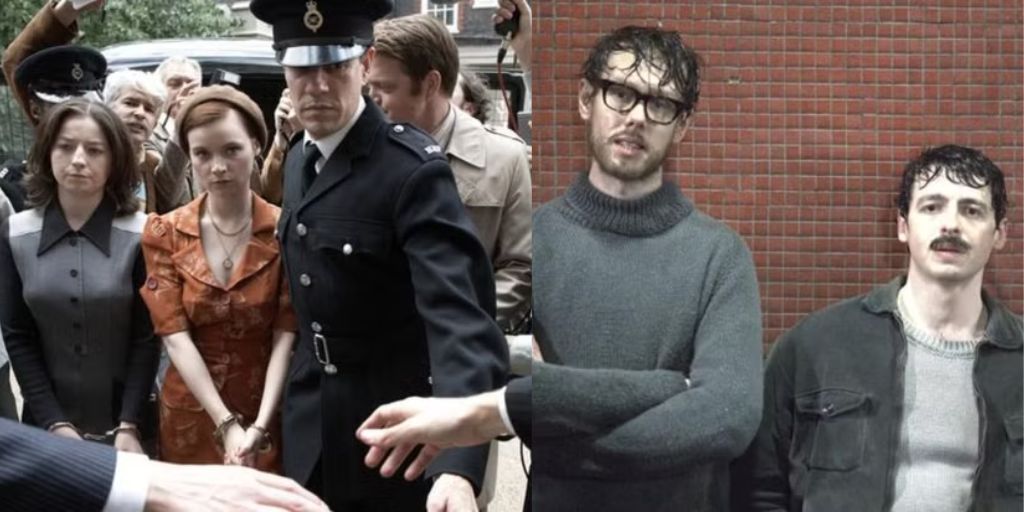In 1972, Jean McConville, a single mother of ten, was abducted by the Irish Republican Army (IRA) and never seen again. This tragic event altered the lives of McConville’s children, who were left searching for answers about their mother’s disappearance.
The case became a major point of interest in the United Kingdom, but it also gained a broader focus when Patrick Radden Keefe, an investigative journalist, examined it in his best-selling non-fiction book Say Nothing: A True Story of Murder and Memory in Northern Ireland.
Keefe’s investigation began after he read the obituary of Dolours Price, a woman who was the first female member of the Provisional IRA. This sparked Keefe’s interest in Price’s role in the violent IRA movement and how her life connected to McConville’s mysterious disappearance.
Keefe’s book became the basis for an adaptation by FX, titled Say Nothing. The series is an intense, nine-episode look at the lives of two women—Dolours Price and Jean McConville—and their connections to the violence of the IRA during The Troubles, a violent conflict in Northern Ireland.
The show tackles heavy themes, including morality, the justification of violence for political causes, and the personal cost of revolution. For those interested in true crime and history, Say Nothing offers a compelling narrative, bringing these complex historical events to life through its vivid storytelling.
What Is Say Nothing About?
Say Nothing opens with a chilling scene: Jean McConville (played by Judith Roddy) is captured at gunpoint by members of the IRA in front of her terrified children. This moment marks the beginning of McConville’s tragic disappearance and sets the tone for the series, which moves back and forth between McConville’s story and that of Dolours Price (Maxine Peake), a key figure in the IRA’s operations.
The show portrays Price’s transformation over time, starting with her youthful enthusiasm for the republican cause and later showing her regret and disillusionment after years of violent action.
The show opens decades after McConville’s disappearance, with an older version of Price (played by Peake) finally speaking out about her involvement in the IRA. Price reveals not only her own involvement in war crimes but also uncovers information about the killings and the mysteries surrounding McConville’s abduction.
The show’s storytelling shifts between flashbacks to Price’s younger days (with Lola Petticrew playing the role of young Dolours) and the present, where Price reflects on her actions. These flashbacks show how Dolours and her sister Marian (played by Hazel Doupe) became members of the IRA.
The Price sisters, alongside other members of the IRA, were not mere supporters—they were active fighters, taking part in bombings, sniper attacks, and other violent operations aimed at freeing Northern Ireland from British rule. They were also responsible for executing traitors within their own ranks, individuals who had betrayed the IRA to the British government.
The story of Say Nothing is not just about Dolours Price, though. As the show unfolds, we learn that McConville’s abduction and the IRA’s involvement in it are deeply connected to Price’s life. The show details how McConville was believed to have been suspected of collaborating with the British forces, a reason the IRA saw her as an enemy to be silenced.
The tragedy of McConville’s fate is wrapped up in the violence and paranoia that marked The Troubles, as both Price and the McConville family’s story become intertwined in the bloody and complex history of Northern Ireland.
A Stellar Ensemble in Say Nothing
FX’s Say Nothing is not only a story of historical events but also a powerful ensemble piece. The show presents a layered portrayal of the conflict, one that stays with the viewer long after the credits roll. It is clear that a great deal of thought was put into casting, and the actors give compelling performances that help bring the weight of these true events to life.
The first episodes of the show focus on the younger versions of the central characters, particularly Dolours Price (played by Lola Petticrew) and Marian Price (Hazel Doupe). Alongside them, the show features key characters like Gerry Adams (played by Josh Finan), the IRA leader who later became a significant political figure.
Anthony Boyle plays Brendan Hughes, a formidable IRA operator who has a major role in the series. The young cast shines in their portrayal of the characters, setting the stage for the later, more reflective moments of the series.
As the show progresses, we see these same characters as older versions of themselves, portrayed by a talented group of veteran actors. Maxine Peake’s portrayal of Dolours Price is particularly notable, capturing both the fiery spirit of the young revolutionary and the deep sense of regret that defines her later years.
The older cast members bring the full emotional range of the story to the screen, with performances that convey the complex internal struggles of individuals caught in the violent conflict of The Troubles.
The show also finds strength in how it handles each character’s story. With a large ensemble, many shows might lose focus on certain characters, but Say Nothing ensures that each of its main figures gets the time and development they deserve.
From Dolours to Gerry Adams to Brendan Hughes, the series shows the human side of these figures, making the audience both angry at their actions and sympathetic to their struggles. This balance of defiance and vulnerability is what makes Say Nothing so powerful.
The series is structured in a way that builds tension around the mystery of McConville’s disappearance. The narrative carefully places clues that suggest who might be responsible, and though the truth is eventually revealed, the discovery doesn’t feel forced or predictable.
The writers, including Joshua Zetumer, Kirsten Sheridan, and Joe Murtaugh, have done an excellent job in adapting Keefe’s book for the screen. The pacing of the story is steady and well thought-out, allowing the mystery of McConville’s abduction to develop alongside the evolving story of Dolours Price’s life.
Recreating History with Care and Precision
One of the standout features of Say Nothing is its commitment to historical accuracy. The show is based on real events, and the team behind the production has gone to great lengths to ensure that the historical context is faithfully recreated. From the wardrobe to the locations to the events themselves, Say Nothing captures the atmosphere of The Troubles with painstaking attention to detail.
The series draws on key historical moments from Northern Ireland’s history, including the 1973 Old Bailey bombing and its aftermath, where Dolours and Marian Price were arrested and sent to prison. The show doesn’t shy away from depicting these events in all their complexity, showing the painful reality of the hunger strikes that followed and the impact that these actions had on the lives of the people involved.
The story also touches on the political ramifications of the conflict, particularly the role of Gerry Adams, who would later help bring about the 1998 Good Friday Agreement, a peace agreement that aimed to end the violence in Northern Ireland.
Despite the intense focus on the IRA and the violence of the time, Say Nothing does not glorify or romanticize the acts of rebellion. Instead, the series presents a balanced view of the cost of violence, both for those who fought for a cause and for those who suffered as a result.
By focusing on Dolours Price’s journey from a young revolutionary to a disillusioned former fighter, the series presents a powerful commentary on the dangers of blind ambition and the lasting scars left by violence.
A Thought-Provoking Reflection on the Past
At its heart, Say Nothing is not just a historical recounting of The Troubles; it is a meditation on the nature of revolution, memory, and the consequences of violence. Through Dolours Price’s life, the series asks difficult questions about the cost of fighting for a cause. Is violence ever justified in the name of political change? What happens when a revolutionary cause leads to more destruction than peace?

The show doesn’t provide easy answers to these questions. Instead, it offers a nuanced portrayal of a turbulent time and the people who lived through it. Say Nothing is not a simple true-crime drama; it is a deeply reflective work that asks viewers to reconsider the past and reflect on how history is remembered.
Final Thoughts
Say Nothing will be available for streaming on Hulu starting November 14. For those interested in true crime, history, and the complexities of political conflict, this series offers a gripping and thought-provoking experience.
With a talented ensemble cast, a well-crafted script, and a deep respect for history, Say Nothing brings the events of The Troubles to life in a way that is both powerful and unsettling. The show reminds us that history is not just about facts and dates—it is about the people who lived through it and the choices they made.




